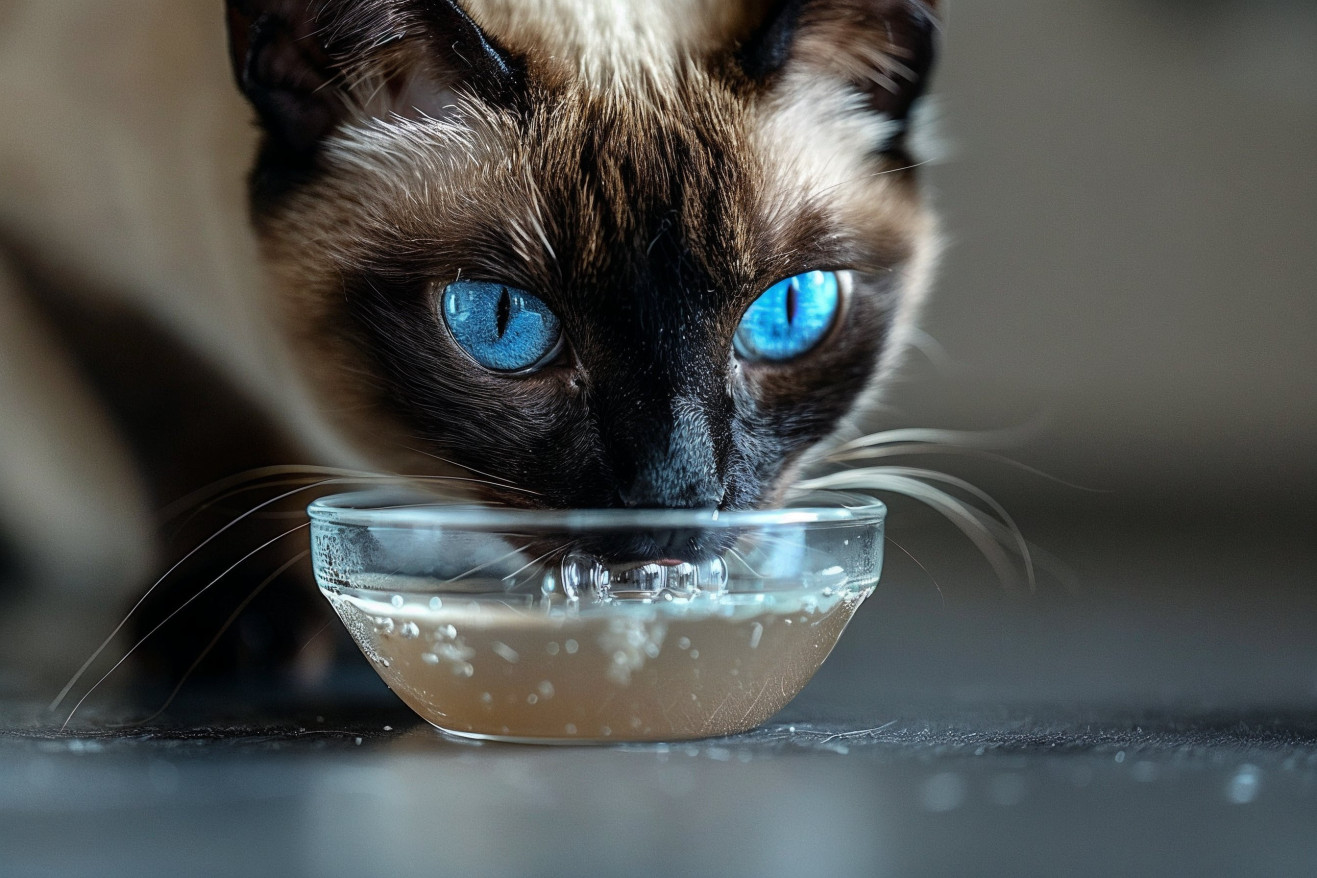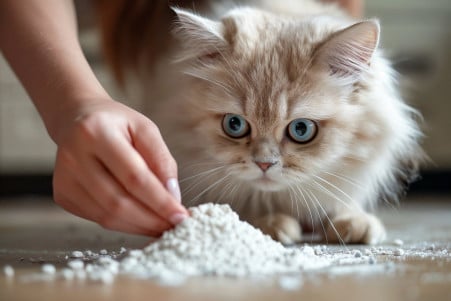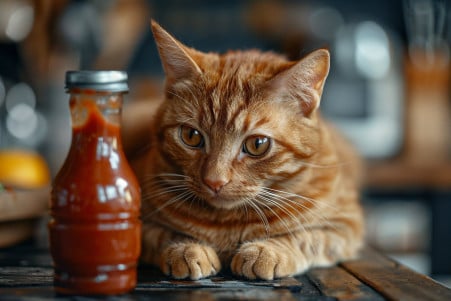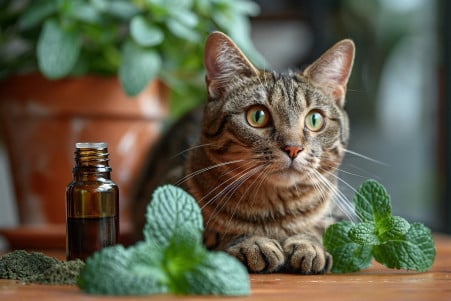Can Cats Have Vinegar? Potential Dangers and Safety
4 May 2024 • Updated 4 May 2024

As a responsible cat owner, you never want to do anything that could potentially harm your pet, but could using vinegar to clean your home or as a flea treatment be putting your cat in danger? While vinegar is often used as a nontoxic, all-natural cleaning solution, vinegar fumes and ingesting vinegar can cause irritation to a cat's eyes, nose, throat and digestive system, so it should be used with caution and rinsed thoroughly if used to clean areas where your cat will be.
We've looked at a variety of veterinary and feline health publications to give you a better idea of how vinegar affects cats. From potential issues with the quality of the air to how toxic it is, this information will help you decide whether or not you want to use vinegar-based products in your home with your furry feline friend. By following some simple safety guidelines, you can make sure you're getting the most out of vinegar while keeping your cat safe.
Is vinegar bad for cats?
Risks of Vinegar Consumption in Cats
The acidity of vinegar is the most significant risk to cats if they consume it. According to the ASPCA, undiluted vinegar can cause irritation in a cat's mouth and stomach. The acidity of vinegar can be especially hard on a cat's digestive system, leading to nausea, vomiting, diarrhea, and other gastrointestinal issues, according to research cited by Catster.
In addition to the potential for digestive problems, the risk of oral and esophageal irritation in cats increases when they consume vinegar and then groom themselves, according to PuaintaCare. Some cats may also be allergic to vinegar, which can lead to skin irritation, itching, or respiratory problems when they come into contact with certain types of vinegar.
In the long term, vinegar consumption can impact a cat's metabolic processes and electrolyte balance, which can lead to organ failure. According to PetMD, the acidity of vinegar can also make kidney problems worse or even cause kidney damage. If your cat consumes vinegar, it's important to take them to the vet right away to ensure any potential health issues are addressed as soon as possible.
How to Use Vinegar Safely for Cleaning and as a Cat Repellent
Despite the potential dangers of vinegar for cats, it can be used safely in the home if it is diluted and rinsed properly. According to Hepper, the smell of vinegar that has been diluted is less likely to bother cats, so it can be used as a natural cleaning solution in areas where cats are present.
CatTipper also recommends using undiluted white vinegar to keep cats away from certain areas or plants. However, it is important to rinse surfaces that have been treated with vinegar to avoid accidental ingestion.
In addition, vinegar can be used to clean litter boxes because its acidity can help break down odors and waste, as noted by Hepper. However, the strong smell of vinegar may be off-putting to some cats.
In general, when using vinegar in a home with cats, it is important to dilute and rinse it thoroughly to reduce the risk of exposure and potential health problems. If these precautions are taken, vinegar can be an effective and safe cleaning and repellent option.
Natural Substitutes for Vinegar for Cats
While vinegar can be harmful to cats, there are plenty of natural substitutes that can help you address some of the most common issues and concerns that arise with your feline friend. For natural flea and tick control, Only Natural Pet suggests essential oils, powders, and sprays, all of which are non-toxic and effective.
Meanwhile, TreeHugger notes that homeopathic and herbal remedies can be used to treat a variety of health issues in cats. For example, when cats have digestive problems, they can be treated with yogurt, chamomile, cranberry, and pumpkin. Skin issues and flea control can be addressed with coconut oil, lavender, and oregano oil.
It's important to talk to your vet before trying any of these options, as natural remedies can still interact with other medications and have side effects. The NHV Natural Pet Products line of vet-formulated supplements includes a variety of natural, holistic options that can help you maintain and improve your cat's health.
What Apple Cider Vinegar Can Do for Cats
Apple cider vinegar (ACV) is chock-full of properties that can be beneficial for cats. As explained by DawgieBowl, ACV is full of enzymes, vitamins, minerals, and probiotics that can help the body of a cat work more efficiently. The Earth Clinic explains that when it comes to pets, raw, organic apple cider vinegar is the most effective because it has all of these properties.
ACV can help support the immune system and improve skin and coat health, which can help with problems like dry skin, dandruff, and even fleas, according to Modern Cat. It can also help with urinary tract infections and the prevention of bladder and kidney stones, according to the same article.
In addition to these uses, DawgieBowl says that ACV can help with weight management, candida, and other health issues in cats. That said, it's important to make sure you're using raw, unfiltered ACV with the mother for the best results and to avoid any potential health risks.
Conclusion: Vinegar Safety for Cats – Key Takeaways
Although vinegar can be harmful to cats, it can be used safely in the home if it is diluted and rinsed properly. According to Hepper, the smell of diluted vinegar solutions is less offensive to cats, so it can be a good natural cleaning option for areas where cats are present.
CatTipper even recommends using white vinegar that has not been diluted as a cat repellent to keep cats away from certain areas or plants. However, it is important to make sure that any surfaces that have been cleaned with vinegar are rinsed well to avoid accidental consumption.
Vinegar can also be used to clean litter boxes because its acidity can help break down odors and waste, as noted by Hepper. However, it's important to note that the smell of vinegar can be off-putting to some cats.
If you are going to use vinegar around cats, make sure that it is diluted and rinsed well to minimize the risk of exposure and potential health problems. If you follow these guidelines, vinegar can be a safe and effective way to clean and repel cats.


